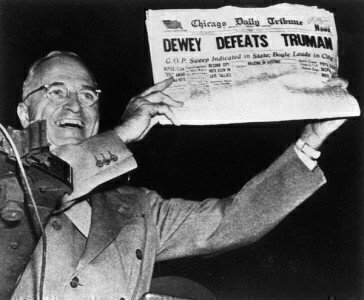Harry Truman went from being a county judge to deciding to use atomic warfare at World War II’s end. Here’s a quick look at 10 facts about Truman’s sudden ascendancy to the White House—and the deal with his middle name.
 Truman was born on May 8, 1884 in Lamar, Missouri. He died at the age of 88 in Independence, Missouri on December 26, 1972.
Truman was born on May 8, 1884 in Lamar, Missouri. He died at the age of 88 in Independence, Missouri on December 26, 1972.
1. Truman was a war hero who saw action in battle. Truman wanted to go to West Point, but poor eyesight kept him from the academy. He enlisted in the National Guard and was an artillery commander during World War I.
2. He wasn’t a success in private business. Truman worked at several jobs, including running a sewing supply shop, farming, and clerking at a bank, until he became a county judge in Missouri.
3. Truman wasn’t a first-choice candidate for the Senate. Kansas City political boss Tom Pendergast was turned down by four other possible candidates in 1934 when he sought a candidate to support for a U.S. Senate election. Truman won office by actively hitting the campaign trail.
4. Truman overcame steep odds to win the 1940 Senate election. When Truman's political ally, Pendergrast, was convicted for tax evasion in 1939, few people thought Truman stood a chance of getting re-elected in Missouri. Again, Truman hit the campaign trail, spoke about his war record and experience as a common man in the Senate, and pulled off another upset.
5. Truman used a key Senate committee to rise to power. At the age of 57, Truman took over a special committee to monitor wasteful spending at business, labor, and government agencies during the World War II. He quickly became a household name as the head of the “Truman Committee.”
6. Truman wasn’t a top candidate for vice president. In 1944, the current vice president, Henry Wallace, was out of favor with many Democrats. Supreme Court Justice William Douglas was FDR’s preferred candidate, and Alben Barkley and James Byrnes were other strong candidates. Truman was a compromise selection who Roosevelt didn’t know well.
7. Roosevelt kept Truman in the dark about war matters. As vice president, Truman had little contact with the president and was asked to mostly deal with matters in the Senate. After FDR died, Truman had to find out the basic facts about the wars in Europe and Asia, and the nation’s secret atomic program.
8. The 1948 election upset wasn’t really an upset. Truman was expected to lose to Republican Thomas Dewey, at least in the eyes of the media. After trailing in public opinion polls, Truman launched an extensive national media campaign that put him back in contention. Before that point, pollsters stopped conducting polls, and didn’t measure the surge for Truman. The rest is history.
9. Truman survived an assassination attempt. Two Puerto Rico nationalists tried to kill Truman in 1950 when he was staying at Blair House while the White House was under renovation. A White House guard died as he killed one attacker. The other attacker was captured. Truman heard the gun fight from his room.
10. Truman had an unusual middle initial. Truman’s parents gave him a middle name of “S” after they couldn’t agree on a middle name as a tribute to relatives whose names both started with the letter “S.” Officially, the “S” is followed by a period: “Harry S. Truman.” That’s because Truman used a period with the letter “S” in his correspondence. The Truman Library & Museum offers a detailed explanation of the "S" controversy.







